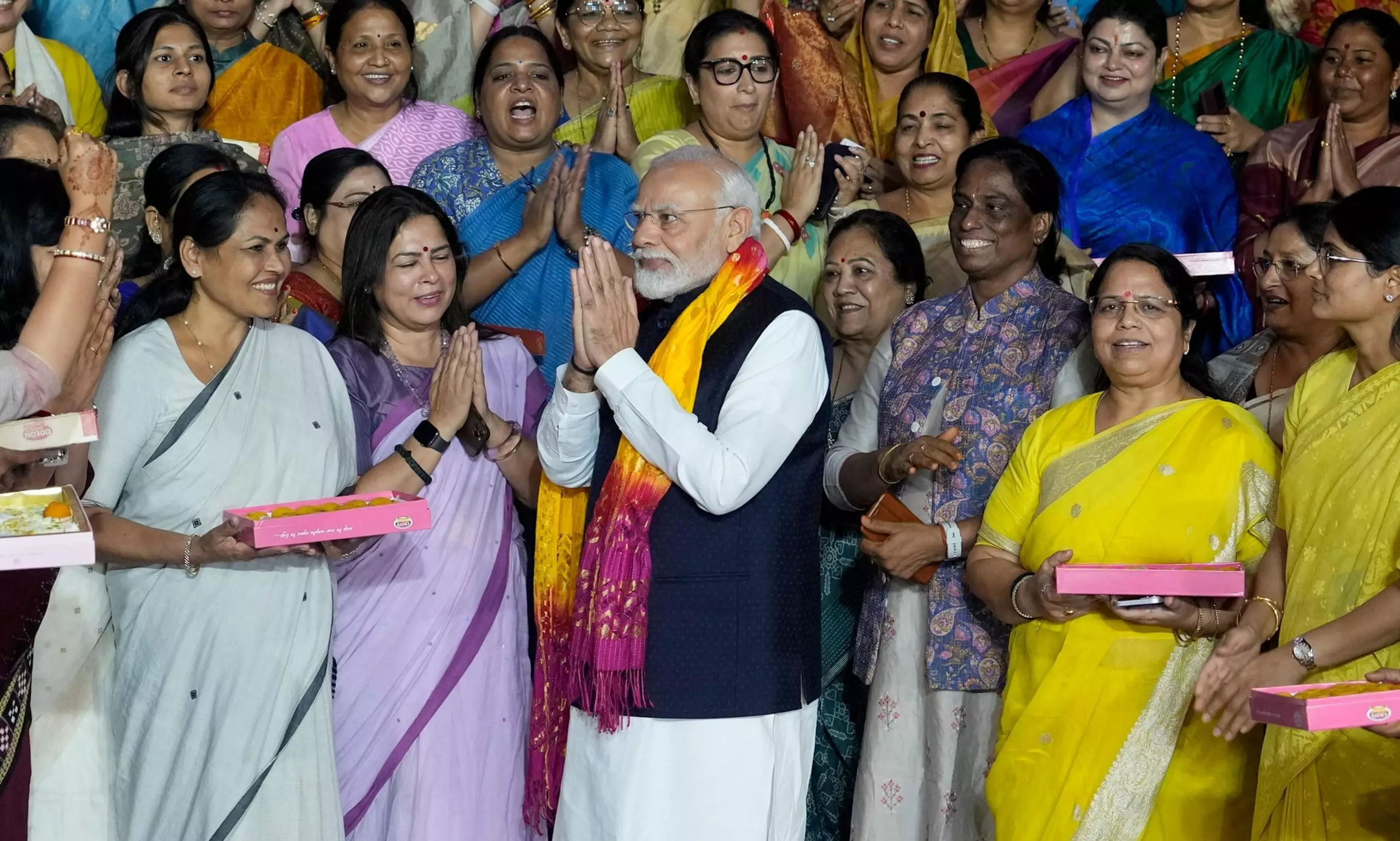
- Home
- India
- World
- Premium
- THE FEDERAL SPECIAL
- Analysis
- States
- Perspective
- Videos
- Sports
- Education
- Entertainment
- Elections
- Features
- Health
- Business
- Series
- In memoriam: Sheikh Mujibur Rahman
- Bishnoi's Men
- NEET TANGLE
- Economy Series
- Earth Day
- Kashmir’s Frozen Turbulence
- India@75
- The legend of Ramjanmabhoomi
- Liberalisation@30
- How to tame a dragon
- Celebrating biodiversity
- Farm Matters
- 50 days of solitude
- Bringing Migrants Home
- Budget 2020
- Jharkhand Votes
- The Federal Investigates
- The Federal Impact
- Vanishing Sand
- Gandhi @ 150
- Andhra Today
- Field report
- Operation Gulmarg
- Pandemic @1 Mn in India
- The Federal Year-End
- The Zero Year
- Science
- Brand studio
- Newsletter
- Elections 2024
- Events
- Home
- IndiaIndia
- World
- Analysis
- StatesStates
- PerspectivePerspective
- VideosVideos
- Sports
- Education
- Entertainment
- ElectionsElections
- Features
- Health
- BusinessBusiness
- Premium
- Loading...
Premium - Events

BJP has to convince women voters it champions cause of women wrestlers and Manipur women; that rapists won't be granted early release akin to Bilkis Bano case
There are no indications, as yet, that patriarchy as a system of power and control is in decline. It continues to flourish, not least because India’s political class has discovered the value of women as a constituency of voters.
From Narendra Modi and the Bharatiya Janata Party (BJP) to Rahul Gandhi and the Congress to the Nationalist Democratic Progressive Party (NDPP), a BJP ally in Nagaland that appointed the first woman as minister after the 2023 state Assembly election, women as voters have become so critical to success that one of the cardinal points of the 2024 Lok Sabha election – and by default the state Assembly elections in Odisha, Andhra Pradesh, Arunachal and Sikkim – are geared to convince this constituency that their best interest lies in voting for a particular party.
The discovery is a bit like the moment when consumer brands found that women were making decisions on what to buy and when to do so. The metamorphosis in Indian politics is a bit like the shift that occurred in the market.
Modi's phone call to Basirhat candidate
The question is, has the agency of women reached a point when their choices become decisive in snatching victory from the near certainty of defeat? Is that why Nari Shakti is like a mantra that all political leaders are consciously chanting?
There is obviously a compulsion at work for Modi to have made a personal phone call to Rekha Patra, the BJP’s candidate from Basirhat constituency within which Sandeshkhali is situated. By describing her as Shakti Swaroopa, or the embodiment of power, Modi is delivering a message and hoping that the symbolism will yield high returns.
If empowering the victim of patriarchal violence was the purpose of Patra’s nomination, the BJP has failed to hit the target. Ms Patra is not a significant symbol of oppression in West Bengal, at this point, which is early in the long-drawn-out election battle.
Not Phoolan Devi
The BJP’s bigger failure is that it has not, till now, converted Patra into an icon, for the Sandeshkhali woman is not Phoolan Devi.
The Samajwadi Party’s contribution to Indian politics was giving Phoolan Devi, a Dalit woman brutalised by the upper caste, who then turned into a top dacoit-bandit leader in the ravines of Chambal, a ticket from Mirzapur Lok Sabha constituency that she won twice.
BJP's pitch
The pitch is simple; the BJP is the champion of women’s dignity and purity. In the context of Sandeshkhali and by extension West Bengal, the BJP is positioning itself to appeal to women voters against the Trinamool Congress (TMC), especially its woman leader, Mamata Banerjee.
The nexus between Trinamool Congress and muscle power and the abuse of that power at the local level in places like Sandeshkhali to oppress and violate the dignity of women has transformed the arena of politics by making women’s bodies a significant battleground.
There are risks in cherry-picking some women as icons, be it as victims or as celebrities.
Rekha Patra as the woman who found her voice through the BJP’s intervention in Sandeshkhali is not the same as Amrita Roy, the BJP’s candidate from Krishnanagar in Nadia district in West Bengal. Patra represents the vulnerability of women at the grassroots; Roy reeks of privilege in exclusive spaces, whose credentials as Shakti Swaroopa are unknown.
Both these women are different from the BJP’s star candidate, Kangana Ranaut, a hard-working Bollywood actor who has worked in assorted roles on the screen, from prostitute to princess.
Uniform gender parity
Having bestowed on Rekha Patra and Kangana Ranaut the roles of torch bearer of a party that is rooted in the aggressive misogyny of the Rashtriya Swayamsevak Sangh (RSS), the BJP’s task is to convince significant numbers of women across all constituencies that it is not only gender sensitive, but it is gender sensitive in all places in exactly the same way.
It requires the BJP to convince Jat women voters that it champions the cause of women wrestlers against sexual abuse by powerful BJP leaders, who are accused of misusing their position to harass even Olympic medal winners.
It requires the BJP to convince women in Manipur and across the country that it defended women attacked, stripped and paraded in public in the ongoing ethnic confrontation between Meiteis and Kukis.
It has to convince women that convicted rapists are not granted early release in what the Supreme Court said was an abuse of power by the Gujarat government in the Bilkis Bano case.
Schemes aimed to woo women voters
In the spate of state Assembly polls preceding the Lok Sabha elections, starting with Karnataka and concluding with the polls in Rajasthan, Madhya Pradesh and Chhattisgarh, there was a fierce competition between the Congress and the BJP to attract women as voters with agency to make independent choices.
Among the guarantees that the two principal contestants in these five states offered women were reduction in price of gas cylinders, free transport, direct cash transfers because women represented a specific constituency as in the Ladli Behena scheme, and direct cash incentives to the girl child for continuing education.
In Karnataka, the Congress wrested the state from the BJP by assuring a halt to corruption and offering five guarantees. In Madhya Pradesh, Chhattisgarh and Rajasthan, the BJP targeted women by offering more cash transfers than the Congress.
The 2023 poll example
The outcome was a slight edge in the number of votes polled by the BJP, ensuring victory. The increased participation of women in voting in these states made a world of difference for the BJP.
Unsurprisingly, the BJP’s Lok Sabha campaign has retained Nari Shakti as a priority. The pressure and the urgency to bring in new voters and win more seats increased after the Prime Minister in his last speech in the 17th Lok Sabha declared that the BJP would win 370 seats and exceed a total tally of 400 seats with its allies in the National Democratic Alliance (NDA).
Power is gender neutral
Women’s empowerment as a political strategy for winning an election has nothing to do with empowerment and everything to do with acquiring or retaining power.
Power itself is gender neutral; Mamata Banerjee has power, as leader and founder of the Trinamool Congress and three times chief minister of West Bengal. J Jayalalithaa had power, as chief minister of Tamil Nadu and leader of the AIADMK. Mayawati as chief minister of Uttar Pradesh had power; she is still powerful as the leader of the Bahujan Samaj Party (BSP), however diminished her present circumstances may be.
As a political strategy, the Modi regime brought in 33 per cent reservation of constituencies in the Lok Sabha and state Assemblies in a rushed legislation that would come into effect after a time lapse of several years.(The Federal seeks to present views and opinions from all sides of the spectrum. The information, ideas or opinions in the article are of the author and do not necessarily reflect the views of The Federal.)


